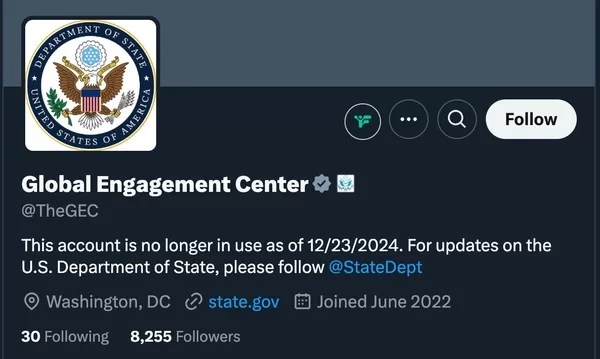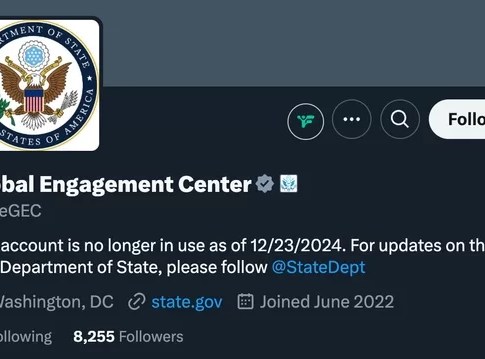The Global Engagement Center Shuts Its Doors: Fallout from Elon Musk’s Criticism and Congressional Defunding
Elon Musk has drawn first blood in his campaign against what he sees as government inefficiency and overreach, successfully lobbying for the closure of the State Department’s Global Engagement Center (GEC), their frontline office for countering foreign disinformation.
The move follows explosive revelations from the Twitter Files investigation, which uncovered internal communications suggesting that the GEC, originally tasked with countering foreign disinformation, had crossed a line by targeting domestic accounts.
Musk, who spearheaded the campaign to defund the GEC, accused the agency of “targeting domestic Americans” and “overstepping its brief,” branding it a threat to democracy.
His efforts culminated in Congress stripping the GEC’s $61 million budget from the federal spending bill, leading to its permanent closure and marking a significant victory for Musk’s broader vision of reining in government intervention in the digital space.

The closure marks the first time in eight years that the United States is without a dedicated agency to track and combat disinformation campaigns from adversaries such as Russia and China.
The decision to defund the GEC followed sustained criticism, most prominently from Elon Musk. In 2023, Musk accused the agency of being the “worst offender in US government censorship [and] media manipulation” and labeled it a “threat to our democracy.”
His remarks, amplified by his vast social media following, catalyzed political scrutiny and intensified the bipartisan debate over the agency’s role in managing disinformation.
Just before Christmas in 2024, a measure to extend the GEC’s $61 million annual budget was stripped from the final version of the federal spending bill that passed through Congress, leading to the immediate closure of the center and the dismissal of its 120-member staff.
A Polarizing Figure in the Fight Against Disinformation
The GEC was established in 2016 under the Obama administration to counter foreign propaganda and disinformation campaigns that undermined democratic values and institutions. Over its tenure, the agency exposed Russian troll farms, debunked falsehoods spread by Chinese state media, and worked closely with social media platforms to mitigate the impact of malign foreign influence.
However, Musk’s pointed criticisms painted the GEC in a far more contentious light. As the owner of X (formerly Twitter), he accused the agency of interfering in online discourse, claiming it had worked to suppress free speech on platforms under the guise of combating disinformation.


The Twitter Files and the Demise of the Global Engagement Center
In December 2022, Elon Musk, having recently acquired Twitter, initiated the release of internal company documents known as the “Twitter Files.” These disclosures, facilitated by journalists like Matt Taibbi, aimed to shed light on Twitter’s prior content moderation practices and its interactions with government agencies.
A significant revelation from these files was the extent of the Global Engagement Center’s (GEC) involvement in content moderation of Americans within the USA, which Musk perceived as overreach and a threat to free speech.
The Twitter Files Exposé
The “Twitter Files” encompassed a series of internal communications and documents that provided insight into Twitter’s decision-making processes regarding content moderation.
The files suggested that the GEC, established to counter foreign disinformation, had extended its reach into domestic social media platforms, influencing the moderation of content within the United States.
Taibbi’s reporting highlighted instances where the GEC flagged accounts and content it deemed as spreading disinformation, leading to their suppression or removal.
This raised concerns about government involvement in censoring domestic speech, blurring the lines between countering foreign threats and infringing upon First Amendment rights.
Supporters vs. Detractors

While Musk’s statements found support among political figures critical of perceived government overreach, defenders of the GEC argue that its closure leaves the US vulnerable to foreign interference.
Proponents of the agency highlight its successes in uncovering Russian efforts to manipulate the 2016 election and debunking Chinese narratives around Taiwan and the origins of COVID-19.
Yet detractors, empowered by Musk’s influence, point to allegations of overreach, including claims that the GEC pressured social media companies to suppress content beyond its stated mission.
The Implications of the GEC’s Closure
The closure of the GEC signals a retreat from a proactive stance on foreign disinformation at a time when adversaries like Russia and China are refining their methods. Both nations continue to deploy sophisticated tactics, including artificial intelligence, to spread false narratives and undermine public trust in democratic institutions.
Without the GEC, there’s no single entity coordinating the response to these threats. That’s a serious gap, that the USA’s rivals will notice.

What Comes Next?

The defunding of the GEC raises critical questions about the United States’ commitment to countering foreign influence in the digital age.
While some advocate for a decentralized approach, with multiple agencies sharing responsibility, others warn that the lack of a centralized authority will make the US more susceptible to manipulation.
For Elon Musk, the closure of the GEC may represent a victory in his fight against what he views as government overreach.
But for national security experts, it’s a troubling development with far-reaching consequences.
The GEC may not have been perfect, but dismantling it without a clear alternative isn’t just short-sighted—it’s dangerous.
The USA is now fighting a 21st-century war with 20th-century tools.
As the dust settles, the broader battle over truth in the information age continues, with foreign actors likely emboldened by the absence of the GEC.
Whether the United States can adapt to this new reality remains an open question.





